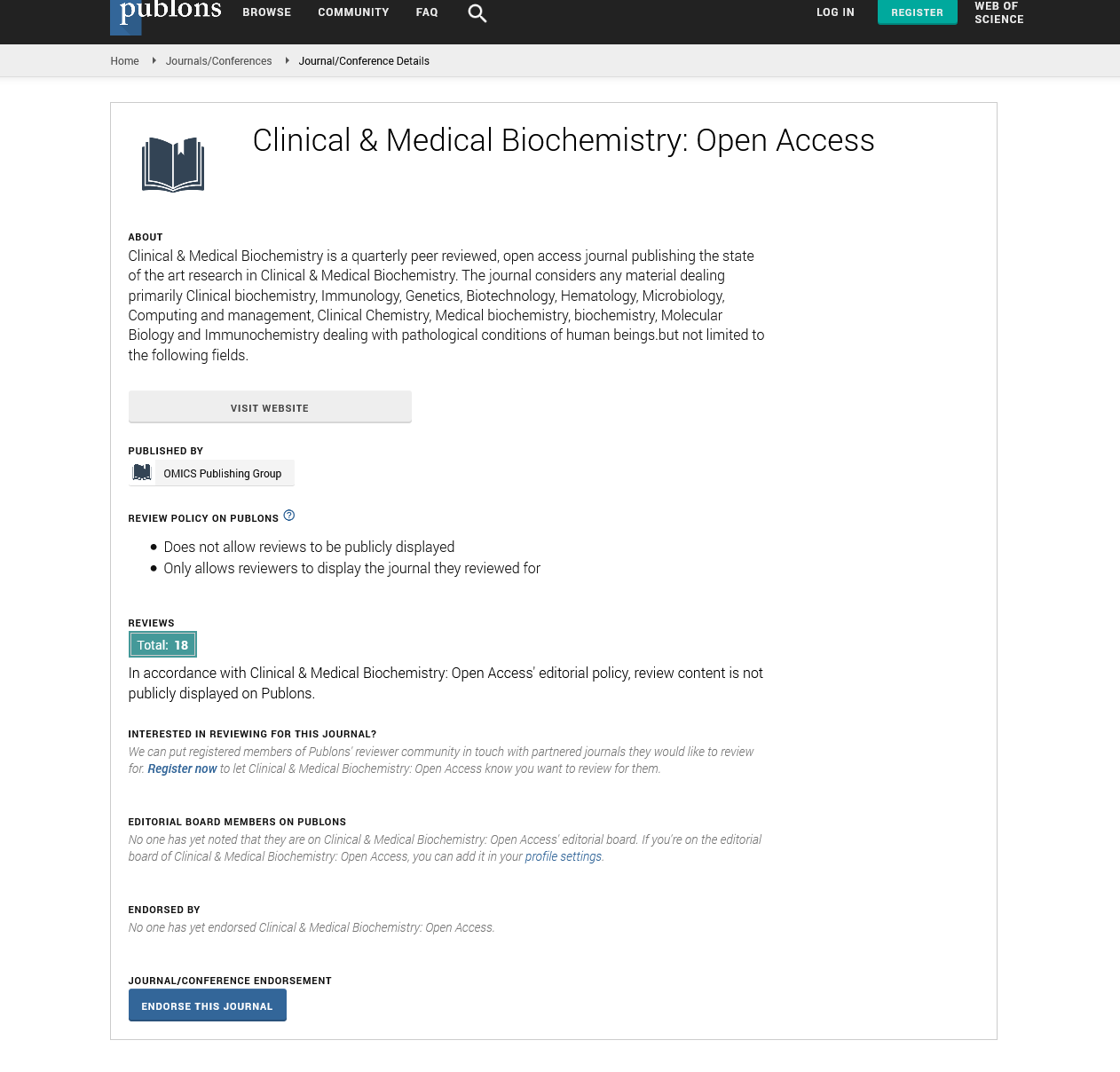Indexed In
- RefSeek
- Directory of Research Journal Indexing (DRJI)
- Hamdard University
- EBSCO A-Z
- OCLC- WorldCat
- Scholarsteer
- Publons
- Euro Pub
- Google Scholar
Useful Links
Share This Page
Journal Flyer

Open Access Journals
- Agri and Aquaculture
- Biochemistry
- Bioinformatics & Systems Biology
- Business & Management
- Chemistry
- Clinical Sciences
- Engineering
- Food & Nutrition
- General Science
- Genetics & Molecular Biology
- Immunology & Microbiology
- Medical Sciences
- Neuroscience & Psychology
- Nursing & Health Care
- Pharmaceutical Sciences
Commentary - (2024) Volume 10, Issue 4
Integrating Bioinformatics with Clinical Biochemistry: Advancements in Disease Diagnosis and Treatment
Harry Wilson*Received: 25-Nov-2024, Manuscript No. CMBO-24-28349; Editor assigned: 27-Nov-2024, Pre QC No. CMBO-24-28349 (PQ); Reviewed: 12-Dec-2024, QC No. CMBO-24-28349; Revised: 20-Dec-2024, Manuscript No. CMBO-24-28349 (R); Published: 27-Dec-2024, DOI: 10.35841/2471-2663.24.10.236
Description
Bioinformatics in clinical biochemistry refers to the application of computational and statistical methods to analyse complex biological data in the context of clinical biochemistry. This interdisciplinary field combines biochemistry, molecular biology, data science and computer science to extract meaningful insights from large-scale biological datasets, such as genomic sequences, protein structures, metabolic profiles and biochemical test results. Bioinformatics has become an essential tool in clinical biochemistry, enabling more accurate diagnoses, personalized treatments and improved patient outcomes.
One of the important applications of bioinformatics in clinical biochemistry is in the interpretation of genomic and proteomic data. Advances in next-generation sequencing technologies have made it possible to sequence the entire human genome rapidly and cost-effectively. This has led to an explosion of data, which bioinformatics tools are used to process and analyse. In clinical settings, the analysis of genomic data can help identify genetic mutations that cause diseases, predict an individual’s risk of developing certain conditions and guide treatment decisions. For example, bioinformatics plays an important role in the identification of genetic variants associated with inherited metabolic disorders, cancer and other diseases.
Proteomics, the large-scale study of proteins, is another area where bioinformatics plays an important role. Proteomic analysis involves the identification and quantification of proteins in biological samples, which can provide valuable insights into disease mechanisms and biomarkers for diagnosis. Bioinformatics tools are used to analyze protein sequences, structures and interactions to identify biomarkers for disease, predict the function of unknown proteins and understand disease pathways at the molecular level. In clinical biochemistry, proteomics has applications in the discovery of biomarkers for early disease detection, prognosis and treatment monitoring. For example, bioinformatics is used to identify cancer-specific biomarkers that can be detected in blood or tissue samples, providing non-invasive methods for diagnosis and monitoring.
Another important area where bioinformatics is applied in clinical biochemistry is in the analysis of metabolic data. Metabolomics is the study of small molecules, or metabolites, in biological samples and it provides a snapshot of the biochemical activity within the body. Bioinformatics techniques are used to analyze data generated by mass spectrometry or nuclear magnetic resonance spectroscopy, helping to identify metabolic biomarkers and pathways involved in disease. In clinical biochemistry, metabolomics has applications in the diagnosis of metabolic disorders, drug metabolism studies and the identification of disease-specific metabolic signatures. For example, bioinformatics can help identify metabolic changes associated with diseases like diabetes, cardiovascular disease and neurological disorders.
Bioinformatics also plays an important role in Clinical Decision Support Systems (CDSS), which are tools that assist healthcare providers in making diagnostic and treatment decisions. By integrating data from various sources, such as laboratory tests, patient medical records and genomic information, bioinformatics-driven CDSS can provide personalized treatment recommendations, predict disease progression and optimize drug therapy. For example, bioinformatics tools can help predict a patient's response to specific drugs based on their genetic makeup, allowing for more precise and personalized treatments. This approach, known as pharmacogenomics, is increasingly used to customize drug therapy in clinical settings.
In conclusion, bioinformatics is revolutionizing clinical biochemistry by providing tools and techniques to analyze and interpret complex biological data. Through the use of bioinformatics, clinical biochemists can gain deeper insights into disease mechanisms, identify new biomarkers and develop personalized treatment strategies. As technology continues to advance, the integration of bioinformatics into clinical biochemistry will continue to improve the accuracy of diagnoses, enhance treatment options and ultimately contribute to better patient outcomes.
Citation: Wilson H (2024). Integrating Bioinformatics with Clinical Biochemistry: Advancements in Disease Diagnosis and Treatment. Clin Med Bio Chem. 10:236.
Copyright: © 2024 Wilson H. This is an open-access article distributed under the terms of the Creative Commons Attribution License, which permits unrestricted use, distribution, and reproduction in any medium, provided the original author and source are credited.

